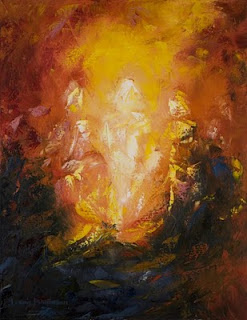 |
| Transfiguration by Lewis Bowman |
Have you ever been walking along a well-known road and suddenly had a bed of flowers take on a vividness which takes your breath away? Similarly, have you ever been walking along or sitting quietly outside when a breeze rustles some leaves above your head and you were struck breathless by an image of the Spirit moving through the world? I have had both happen, and, in the face of God's constant presence, what is in some ways more striking is how infrequent such peak moments are.
For the past two weeks we have been reading the central chapter of Matthew's Gospel --- the chapter that stands right smack in the middle of his version of the Good News. It is Matt's collection of Jesus' parables --- the stories Jesus tells to help break us open and free us from the common expectations, perspectives, and wisdom we hang onto so securely so that instead we might commit to the Kingdom of God and the vision of reality it involves. Throughout this collection of parables Jesus takes the common, too-well-known, often underestimated and unappreciated bits of reality which are right at the heart of his hearers' lives. He uses them to reveal the extraordinary God who is also right there in front of his hearers. Stories of tiny seeds, apparently completely invisible once they have been tossed about by a prodigal sower, clay made into works of great artistry and function, weeds and wheat which reveal a discerning love and judgment which involves the careful and sensitive harvesting of the true and genuine --- all of these and more have given us the space and time to suspend our usual ways of seeing and empower us to adopt the new eyes and hearts of those who dwell within the Kingdom of God.
Taking Offense at Jesus:
Learning to See With New Eyes:
I watched a video today of a man who was given Enchroma glasses --- a form of sunglasses that allows colorblind persons to see color, often for the first time in their lives. By screening out certain wavelengths of light, someone who has seen the world in shades of brown their whole lives are finally able to see things they have never seen before; browns are transformed into yellows and reds and purples and suddenly trees look truly green and three-dimensional or the colorful fruit of these trees no longer simply blend into the same-color background. The man was overwhelmed and overcome by what he had been missing; he could not speak, did not really know what to do with his hands, was "reduced" to tears and eventually expressed it all as he hugged his wife in love and gratitude. Meanwhile, family members were struck with just how much they themselves may have taken for granted as everyday they moved through their own world of "ordinary" color and texture. The entire situation involved a Transfiguration almost as momentous as the one the disciples experienced in today's Gospel.
For most of us, such an event would overwhelm us with awe and gratitude as well. But not Peter --- at least it does not seem so to me! Instead he outlines a project to reprise the Feast of Tabernacles right then and there. In this story Peter reminds me some of those folks (myself included!) who want so desperately to hang onto and even control amazing prayer experiences --- immediately making them the basis for some ministerial project or other; unfortunately, in doing so, they, in acting too quickly and even precipitously, fail to appreciate these experiences fully or learn to live from them! Peter is, in some ways, a kind of lovable but misguided buffoon ready to similarly build booths for Moses, Elijah and Jesus in a way which is consistent with his tradition --- while neglecting the qualitative newness and personal challenge of what has been revealed and needs to be processed in personal conversion. In some way Matt does not spell out explicitly, Peter has missed the point. And in the midst of Peter's well-meaning activism comes God's voice, "This is my beloved Son. Listen to him!" In my reflection on this reading this last weekend, I heard something more: "Peter! Sit down! Shut up! This is my beloved Son! Listen to him!!!"
Like Peter, and like the colorblind man who needed to wear the glasses consistently enough to allow his brain to really begin to process colors in a new way, we must take the time to see what is right in front of us. We must see the sacred which is present and incarnated in ordinary reality. We must listen to the One who comes to us in the Scriptures and Sacraments, the One who speaks to us through every believer and the whole of creation. We must really be the People of God, the "hearers of the Word" who know how to listen and are obedient in the way God summons us to be. This is true no matter who we are or what our usual station in life. Genuine obedience empowers new life, new vision, new perspectives and reverence for the ordinary reality God makes Sacramental.

































.jpg)























